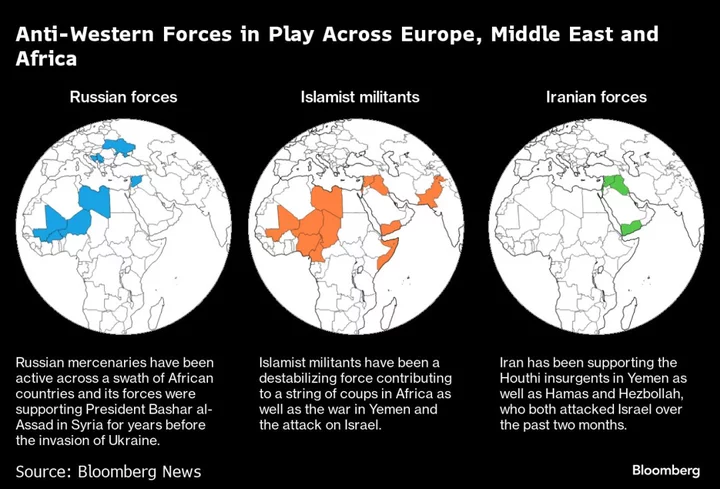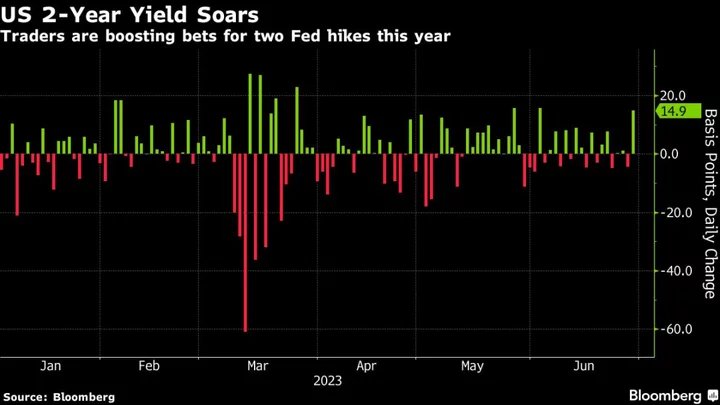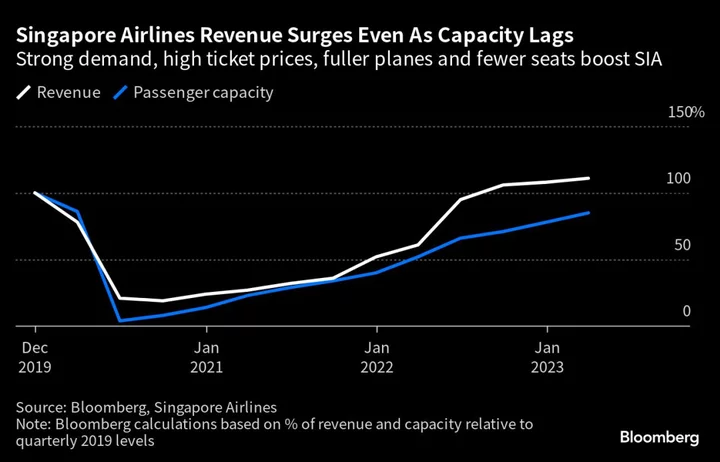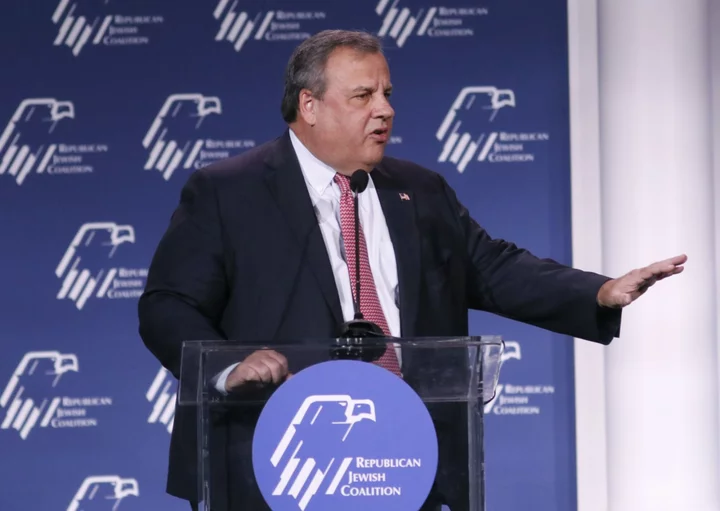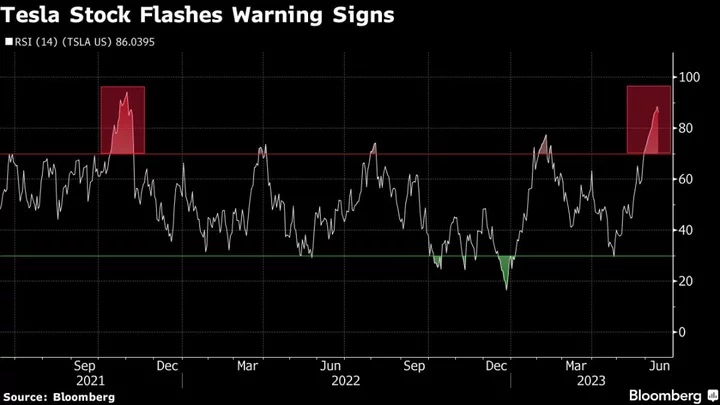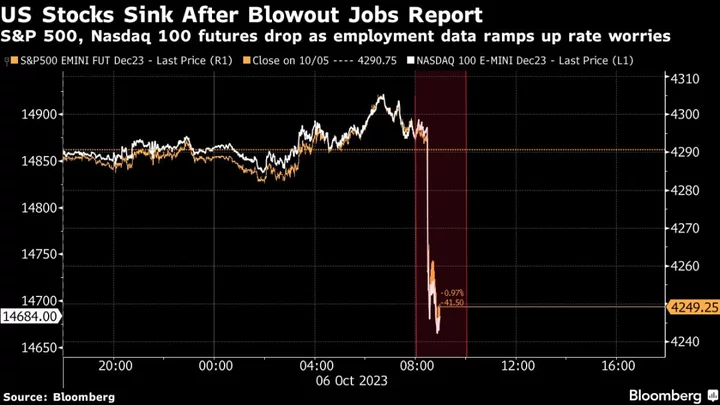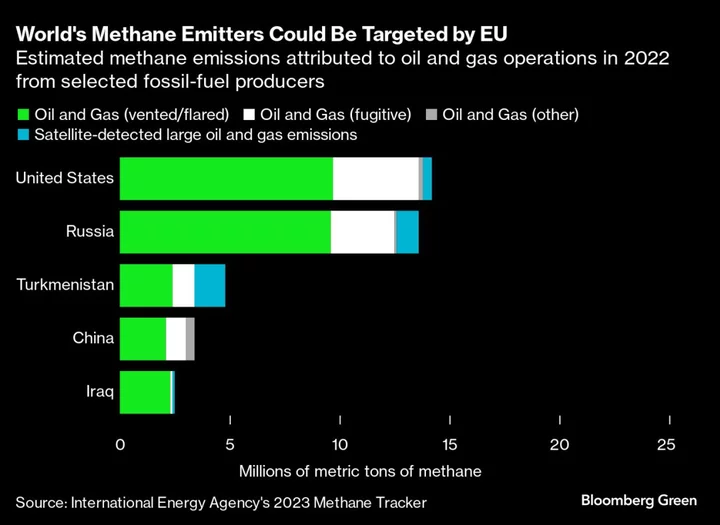Officials and investors are starting to worry that the world is sliding toward a new era of great-power conflict, as the number of flashpoints multiplies from West Africa through Ukraine to the Middle East.
With countries scrambling to protect their interests and frozen conflicts again running hot, for some, the web of overlapping conflagrations carries echoes of the period before World War I when the pacts linking major opposing blocs dragged Europe into a continental war.
“History rhymes,” Gabrielius Landsbergis, foreign minister of Russia’s Baltic neighbor Lithuania, said in an interview on Monday, pointing to the number of countries lining up to challenge the US and its allies.
Hamas’s assault on Israel, which caught the security services there and in Washington off guard, brought the risks into focus for many investors, while research by Bloomberg Economics shows the fighting around the world is poised to do more damage to the global economy than at any time since 1945. With Western attention stretched between Ukraine, and China’s ambitions in the Pacific, the attack showed how opponents of the US-led global order might seize the moment to strike, increasing the risk of a fatal misstep or an escalation.
In the aftermath of those Oct. 7 attacks billionaire hedge fund manager Paul Tudor Jones called the geopolitical environment the “most threatening and challenging” he’d ever seen, citing Iran and Israel as the most likely countries to trigger “a First World War cascade.”
“The world is now completely dependent on the good sense of leaders to avoid an Armageddon,” said Elliott Investment Management founder Paul Singer.
To read the full Bloomberg Economics report on the terminal, click here.
Bloomberg spoke to more than a dozen senior officials from the US, Europe, other G-20 nations and NATO, most of whom agreed to share their views on the condition of anonymity.
As the ceasefire between Israel and Hamas gets a further extension, careful diplomatic efforts to prevent the war there from spreading wider have so far been successful, and yet the heightened global tensions have fueled concern that some sort of misjudgment could bring major powers into confrontation.
Chinese President Xi Jinping’s recent visit to the US saw him agree with US President Joe Biden to better manage tensions, a month after the China reaffirmed its support for Putin’s Russia.
Read More: Xi’s Big Week Ends With Rare Wins on US Ties, Taiwan, Economy
Still, the reignition of fighting in the Middle East has “huge explosive potential not only for a regional conflict, but even a global one” said Czech President Petr Pavel, who was formerly chief adviser to NATO, last week in Prague. He said he saw acute dangers in how the war that began on Oct. 7 had started “to divide the world,” according to the CTK news agency.
One Kremlin insider judged that Hamas’s decision to strike was influenced by the fact that the US was preoccupied with the conflict in Ukraine. In the same way, he said, Azeri President Ilham Aliyev had spotted an opportunity to take the disputed Karabakh region from Armenia because Russia, the Armenians’ main backer, was similarly distracted.
Indeed, the Israel-Hamas war serves as a reminder of how strategists in Washington, or indeed Beijing, can be caught by surprise. In an article published just before the attack and quoted often since then, US National Security Adviser Jake Sullivan said, “The Middle East region is quieter today than it has been in two decades.”A senior European diplomat who’s spent time in Israel agreed they never could have imagined the security apparatus there could be blindsided in the way that it was by Hamas, which is designated a terrorist group by the US and EU. After all, many policymakers working today grew up at a time where warfare felt more distant — something Bridgewater Associates’ founder Ray Dalio pointed out just after the violence broke out.
“The United States and its allies are facing an unprecedented period of volatility and complexity,” said Michele Flournoy, who was the principal adviser to the Defense Secretary during the Obama administration. “These challenges to the inherited rules-based order are driving us toward a more multi-polar and less integrated world.”
Asked specifically this week by reporters about NATO’s preparation for a possible third world war, its head Jens Stoltenberg said that he was focused on preventing the war in Ukraine from turning into a direct NATO-on-Russia fight, and that is why the alliance is increasing the military presence on its eastern flank. “We do this not to provoke a conflict but to prevent a conflict,” he said.
That’s evident to the western countries who are struggling to contain Russian misinformation efforts. Russian propagandists are seeking to play up the links between the world’s wars to convince the Global South in particular that the fighting in Ukraine is part of a broader shift in the global order, rather than just a war of aggression.
“The Third World War is already under way,” according to Fyodor Lukyanov, who advises the Kremlin on foreign policy. “It’s not like the two first world wars. We see a growing number of major regional conflicts. And these are not the last.”
Indeed, parallels to the violence of more than a century ago offer limited clues for the governments trying to game out how all those conflicts might play out.
Information warfare has transformed the nature of both attack and defense, while the advent of nuclear weapons helped has keep a lid on direct superpower escalation since the start of the Cold War.
Russia’s Vladimir Putin was issuing nuclear threats early in the invasion of Ukraine, but he dialed them down around the time that Xi Jinping and Narendra Modi urged him to back off.
Instead, Russia has deployed disinformation techniques as part of its hybrid warfare. As well as attempts to influence the 2016 US election, they’ve also been honed in Sub-Saharan Africa recently. “Russia’s online and offline influence campaigns have acted as an accelerant, driving polarization and cementing the authority of often outwardly pro-Russian coup leaders,” according to a report by the Microsoft Threat Analysis Center.
The cost of conflict to the global economy this year is on course to be the highest since the end of World War II, research from Bloomberg Economics shows, as the post-war peace dividend that allowed countries to focus resources on healthcare and education at the expense of defense appears to be fraying.
“The hope is that the current surge in conflict is driven by one-off factors that are painful, but not the start of a trend,” Bloomberg economists Alexander Isakov, Gerard DiPippo and Ziad Daoud said in the report. “If that’s not the case, and there are structural factors at work — like the end of America’s unipolar moment — conflict, and its economic costs, will continue to rise.”
One of the resources being siphoned off is attention, as officials around the world rush to contain conflict instead of furthering economic development.
War, instead of investment, was the main focus of Saudi Arabia’s recent flagship investment conference. Brazilian President Luiz Inacio Lula da Silva, who sees a connection between the fighting in Ukraine and Gaza, has urged his diplomats to spend their time avoiding escalation, according to two people familiar with his thinking.
For Singaporean Foreign Minister Vivian Balakrishnan, who spoke at the Bloomberg New Economy Forum in his country last month, it’s the “tripwires” in Taiwan and the South China Sea that are the focus of his concerns, with major powers lining up on either side just as they are in Ukraine and Gaza.
“The last time that happened globally was the First World War,” he said.
Here are some of the other risks worrying officials:
The Balkans
Ukrainian officials are concerned that support for their fight against Russia may be compromised because the US is stretched by deployments in the Middle East as well as its continued vigilance over Taiwan.
They also see how that limits Washington’s ability to act as a deterrent elswhere and have identified the Balkans as another place the poses the risk. A September siege in a Kosovo monastery was the deadliest inter-ethnic clash there in almost two decades although tensions in Bosnia are a bigger concern to officials in Kyiv.
North Korea
One serving US official said it was possible that North Korea or others seek to take advantage of the moment by testing inter-continental ballistic missiles, or by launching a nuclear test.
In September, Pyongyang committed to “exponential” growth of its nuclear arsenal in defiance of US requests to return to stalled negotations.
The Caucasus
Some European Union states are worried that Azerbaijan could be tempted to follow up its September victory in Nagorno-Karabakh with an invasion of Armenia. France, according to documents seen by Bloomberg, has been pushing other EU members to respond by boosting their support for Armenia and considering sanctions should Baku make a move on Armenia — something of which Aliyev has ruled out.
A wider conflict in the region would be extremely complex, since Russia also has a defense pact with Armenia and a military base in the country while NATO-member Turkey signed a defense agreement with Baku after helping Azerbaijan win a 2020 war with Armenia that killed thousands on both sides.
--With assistance from Natalia Drozdiak, Samy Adghirni, Alberto Nardelli, Milda Seputyte, Daryna Krasnolutska, John Bowker, Simone Iglesias, Andrea Dudik, Iain Marlow and Peter Martin.

